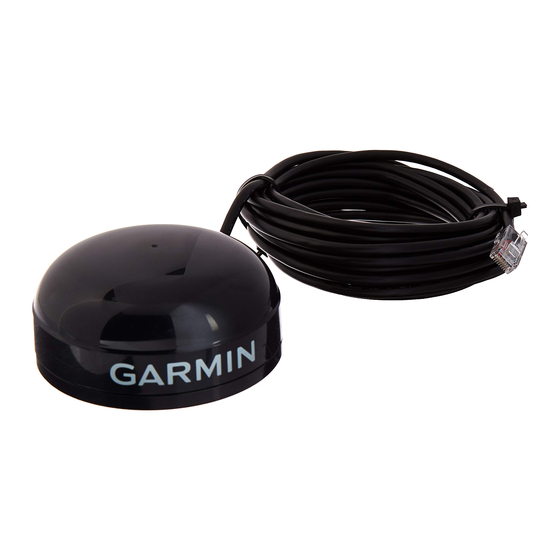Garmin GPS 16-HVS Manuale di istruzioni - Pagina 10
Sfoglia online o scarica il pdf Manuale di istruzioni per Sistema GPS marino Garmin GPS 16-HVS. Garmin GPS 16-HVS 30. Instruction manual
Anche per Garmin GPS 16-HVS: Manuale di riferimento (1 pagine), Specifiche tecniche (40 pagine), Specifiche tecniche (37 pagine), Dichiarazione di conformità (2 pagine), Manuale di istruzioni (30 pagine)

GPS16-HVS GPS Receiver
4. CRBasic Programming
4.1 Read GPS Data
4.1.1 SerialOpen
4.1.2 SerialIn
6
Warm Start
One satellite in use, time from GPS Real Time Clock (not GPS), no position:
$GPGGA,183806.0,,,,,0,01,,,,,,,*7D
Valid GPS Fix
Three satellites acquired, time and position valid:
$GPGGA,005322.0,4147.603,N,11150.978,W,1,03,11.9,00016,M,-
016,M,,*6E
If the almanac and ephemeris data are not stored in the non-volatile data, GPS
acquisition time is less than 5 minutes. If only the ephemeris data are
unknown, acquisition time is less than 45 seconds. If all data are known
(warm start), GPS acquisition time is less than 15 seconds.
CRBasic is used to write programs for the CR1000, CR3000, CR800, and
CR850 dataloggers. These dataloggers use several instructions to read GPS
output, which is asynchronous serial data. As shipped from Campbell
Scientific, the GPS receiver will output data once a second, 1200 baud, 8 data
bits, no parity, and 1 stop bit. Only the GPGGA string is output. See Section
3 for details on the GPGGA string. See Appendix D for specifics on changing
the GPS receiver setups, including using higher baud rates, which the CR1000,
CR3000, CR800, and CR850 support.
In the following program example please note that both output tables may not
be required, and are only examples. The output intervals of the data tables are
also of concern. These items must be considered when determining the output
data required for individual applications and any potential data storage
constraints. Finally, the use of the PPS line is not addressed for the CR1000,
CR3000, CR800, and CR850 dataloggers. Typically this is not required due to
these dataloggers' ability to execute tasks concurrently.
SerialOpen is used to open the appropriate serial port, specify the baud rate,
data format, etc. Any of the six serial ports may be used, but option codes 3, 4
and 5 are not used in this application. Data format is zero, TX delay is zero,
buffer size should be about 2000, which is large enough to prevent the
GPGGA string from overrunning the buffer before data is read by the SerialIn
instruction. If memory is limited, the buffer size can be smaller.
Example: SerialOpen (com1,1200,0,0,2000)
The SerialIn instruction removes data from the buffer declared in the
SerialOpen instruction and places the data in a variable of type string. Use a
timeout of 20, a termination character of 13, and maximum number of
characters of 100, or 1 less than the size of the destination variable. Declare a
string variable of size 101 before using SerialIn.
